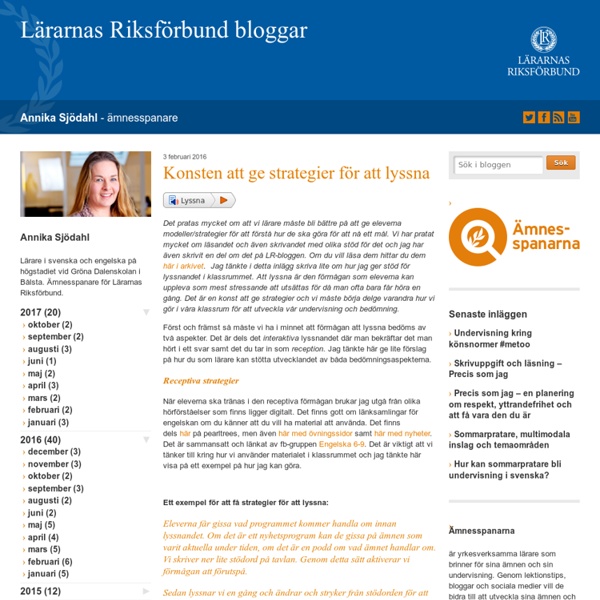



http://lrbloggar.se/annikasjodahl/konsten-att-ge-strategier-for-att-lyssna/
Related: lyssna • Övrigt • Annika SjödahlListen to English around the World. Click on any of the flags below to hear accents from some of the main English-speaking countries. Hear more English accents. One of the best ways of improving your English is to listen to radio news and discussion in English on your computer. How To Be A Great Teacher, From 12 Great Teachers : NPR Ed Sarah Hagan, a young algebra teacher in rural Oklahoma oil country, stays where she is because her students "deserve better." Elissa Nadworny/NPR hide caption toggle caption Elissa Nadworny/NPR Sarah Hagan, a young algebra teacher in rural Oklahoma oil country, stays where she is because her students "deserve better." Elissa Nadworny/NPR Great teachers have two things in common: an exceptional level of devotion to their students, and the drive to inspire each one to learn and succeed.
Learn 46 Languages Online for Free Open Culture How to learn languages for free? This collection features lessons in 48 languages, including Spanish, French, English, Mandarin, Italian, Russian and more. Download audio lessons to your computer or mp3 player and you’re good to go. Amharic
Educational Technology and Mobile Learning: Grammarly- A Great Tool to Help Students with Their Writing February 9, 2016 Grammarly is an excellent Chrome extension students can use to help them with their writing. It provides a free spell and grammar checker that can be used across different platforms including sites such as Facebook, Twitter, LinedIn, Gmail…etc. It’s true, most of online editors now come with sophisticated spell checking services but only few provide contextual spell and grammar checking. Grammarly ‘spots erroneous use of lose/loose, affect/effect, lie/lay, there/their/they’re, and many more commonly confused words.’
Experimenting with English (Part 2) – Activities for learners to do outside the classroom [26 and counting!] In my blog post Experimenting with English: scaffolding learner autonomy, I discussed how I approached helping my learners to use English outside the classroom, drawing on learner autonomy theory and methodology (e.g. Benson, 2011; Oxford, 2003; Smith 2003). Central to that project, alongside the very important element of discussion, was a handout I created for my learners. Why some people find learning a language harder than others Scientists at McGill University in Canada found that if left anterior operculum and the left superior temporal gyrus communicate more with each other at rest, then language learning is easier. "These findings have implications for predicting language learning success and failure," said study author Dr Xiaoqian Chai. For the study, researchers scanned the brains of 15 adult English speakers who were about to begin an intensive 12-week French course, and then tested their language abilities both before and after the course. Participants with stronger connections between the left left anterior operculum and an important region of the brain's language network called the left superior temporal gyrus showed greater improvement in the speaking test. However, that doesn't mean success at a second language is entirely predetermined by the brain's wiring. How the brain is wired determines whether someone can learn a second language easily Photo: ALAMY
Recipes for the EFL classroom Not sure what to do with a listening text coming up soon in the unit? Don’t like the comprehension questions in the book? Want some ideas to liven it up? Pre-listening Prediction work can be a really useful pre-listening activity, preparing the students for what they are about to hear. Eight important facts about Working Memory and their implications for foreign language teaching and learning Introduction There is no blogpost of mine which does not mention Working Memory (WM) at some point. Why? Because effective language processing and learning largely depends on how well Working Memory performs.
Classroom Materials Lesson plans and activities for all key stages, built around Poetry Archive recordings and offering lively, engaging ways of working with poetry at all Key Stages. Granny Is - teaching ideas on Valerie Bloom, Michael Rosen and others. I, Too - lessons on this famous poem and many more past and present. Green Lane - lessons on Stephanie Norgate, Fergus Allen and others. Six ‘useless’ things foreign language teachers do Recasts Recasts are the most frequent form of feedback that teachers give students in the course of oral interactions. They consists of utterances by the teacher that repeat the student’s erroneous utterance but ‘fix’ the mistake(s) without changing the meaning in any way. Example: